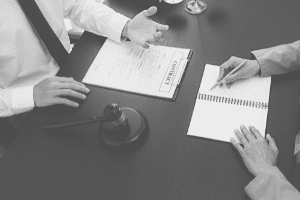What are the consequences of making mistakes as an executor?
As an executor, you have the important task of going through a Will and gathering and distributing the assets to the relevant beneficiaries (those who benefit from the Will). With this comes great responsibility.
There are a number of ways in which an executor can be held personally liable for mistakes they may make even if the error is innocent.
What are the responsibilities of an executor?
The executor’s role when someone dies is to go through everything that the deceased has such as property, cash savings, bank accounts, businesses, pensions, and other assets, and estimate the value of everything. This is known as the “estate.”
The executor will need to assess whether there are any outstanding debts or liabilities owed and pay any Inheritance Tax due.
The remaining assets will then be collected and distributed between the beneficiaries who will inherit them. This may involve selling any property or identifying and liquidating any bank accounts.
What common mistakes can be made as an executor?
-
Incorrectly gathering a deceased’s assets
With some estates, it may be difficult to uncover all the assets that a person has accrued and acquired over their lifetime. For instance, it is common for people to have multiple pension pots, overseas bank accounts, and stocks and bonds held with online financial institutions. These can be hard to track down especially if the deceased has made no mention of them in their Will. Nevertheless, it is the responsibility of the executor to find, gather and distribute these assets, otherwise, they can be personally liable to the creditors and executors.
-
Not calculating assets correctly
If an executor does not calculate assets correctly, it means that the beneficiaries will not be getting the full amount that they are entitled to. It is therefore important to ensure that property and physical assets are properly valued at market value so as to avoid being made personally liable for financial losses.
-
Distributing assets to bankrupt beneficiaries
Executors must be careful that they are not distributing assets to bankrupt beneficiaries as the money must be used to pay off Trustees of the bankruptcy. An executor can be personally liable for any money that can not be recovered from the bankruptcy if it is distributed directly to the beneficiary.
-
Not calculating Inheritance Tax right
An executor is required that you calculate Inheritance Tax on the total value of the deceased’s assets. This information is then passed on to HMRC. Failure to do so can result in penalties.
-
Not showing reasonable effort to contact missing beneficiaries
It may be that an executor is struggling to track down certain beneficiaries, maybe they have moved abroad or their contact details are not easily accessible. In such cases, the executor must show that they have made an effort to try to find beneficiaries as they are responsible for giving them their inheritance.
-
Not keeping records
It is important to keep records of avenues that have been explored to find certain information such as tracking down assets, searching for missing beneficiaries, notifying certain institutions of the deceased’s death, calculating assets, etc. In addition, it is vital that executors save receipts, evidence of paid debts, invoices, and balance sheets to show that they are properly undertaking their role so as to avoid liability.
-
Not addressing debts
It is the responsibility of the executor to ensure that all bills, debts, and liabilities including future ones are all paid off before the remaining assets are distributed amongst the beneficiaries. If the executor is not careful, creditors can demand payment of unpaid debts after the estate has been distributed. The problem with this is that once an estate has been distributed to the beneficiaries, the executor can be personally liable for any unpaid debts.
-
Not protecting assets
This can include things like not insuring empty property meaning it is exposed to criminal damage or stolen assets. Executors must also freeze bank accounts to ensure that money cannot be taken out illegally. People who hold Power of Attorney in some cases are allowed access to an individual’s bank account and if an executor has not notified the bank of the death, then the Attorney is able to continue to access the account.
-
Failing to notify people of the death
A key part of protecting the estate is to notify financial institutions including banks that the person has died so that the account can be frozen.
What can happen if an executor makes mistakes?
If you make mistakes as an executor of an estate you can be held legally liable even if the mistakes are unintentional.
When you become an executor of a deceased’s Will, you are personally taking on the responsibility for administering the estate.
Executors can be exposed to claims made by creditors and beneficiaries for any financial losses they suffer as a result of the executor’s mistakes.
What can an executor do to avoid mistakes?
In order to ensure that as an executor you are not held liable for mistakes, it is important to be cautious when administering an estate which means getting advice, doing thorough research, and keeping accurate records to show that your intention is to do the job correctly and legally.
You must be aware of the steps you should take to avoid mistakes being made. For instance, to avoid creditors coming forward once the estate has been distributed to beneficiaries, the executor can place notices under Section 27 Trustee Act 1925 and in the Gazette or the local newspaper to allow creditors to register any debts. Creditors have 2 months from the date of publication to come forward.
Additionally, executors can get insurance to cover any errors that are made in the process. But the best solution would be to instruct a solicitor to ensure that your actions are covered and that you are taking each step according to the law.
At Ackroyd Legal, we understand how stressful the role of an executor can be. If you would like to seek legal advice as an executor or would like help with administering an estate, please contact one of our expert probate lawyers today on 020 3058 3363.






